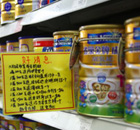Top Biz News
China's 'sock capital' grows on clustering
(Xinhua)
Updated: 2009-12-21 16:01
 |
Large Medium Small |
Exports of China's "sock capital," Datang, rose 6.7 percent in the first 11 months, as manufacturers elsewhere found themselves mired in the global economic downturn.
Datang, a town in east China's Zhejiang province that specializes in making socks, exported 3.5 billion pairs of socks worth $530 million from January to November, said Yuan Zhigang, Datang's Party chief.
The 6.7 percent growth outshines most of China's export-oriented cities as exports dived 18.8 percent and those of Zhejiang declined 16 percent in the first 11 months, according to the National Bureau of Statistics and the Department of Commerce of Zhejiang province.
With its 70,000 population and 130,000 migrant workers living on making socks, Datang acquired the nickname "the capital of socks" as city officials claimed it produced one in every three pairs of socks worn on the planet.
Datang's advantages in the global hosiery market were well beyond cheap labor and resources, said Professor Lin You, director of the Zhejiang University Industrial Development Research Center.
Lin said Datang's real edge is the myriad sock-related businesses clustered together, including textile material processors, yarn dealers, sewing firms, pressing operations, packagers, and forwarders.
Proximity of closely related firms in the same industry helped save operational and transaction costs and provided easier access to skilled and specialized workers, Lin said.
China's local clusters of consumer goods manufacturers contributed greatly to bringing China's industry to global prominence, said Professor Wang Jici, of Peking University's College of Urban and Environmental Sciences.
Wang said clustering and networking helped small and medium-sized enterprises to raise their competitiveness by being more specialized.
In Datang, specialists abound for every procedure of making socks. There are even workers specializing in binding pairs of socks with metal clips, said Yuan.
| ||||
"Closely related firms in the same industry benefit from sharing of technological or marketing knowledge, and learning effects may be easier to achieve because it is easier to monitor what the neighbors do and learn from their successes and mistakes, " said the report.
However, Lin warned that Datang could not live on its low-end socks forever as workers' pay and costs of land and resources rose.
Datang had to upgrade and produce more high-value-added socks if it was to continue flourishing and retain its strong position in the global marketplace, Lin said.










